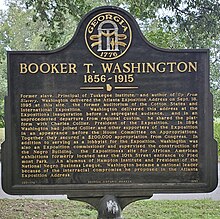What came to be known as the Atlanta Compromise stemmed from a speech given by Booker T. Washington, president of the Tuskegee Institute, to the Cotton States and International Exposition in Atlanta, Georgia, on September 18, 1895. It was first supported and later opposed by W. E. B. Du Bois and other African-American leaders.
In the speech, also known as the Atlanta Exposition Speech, Washington promoted vocational education, industrial occupations, and the learning of other practical trades that would give African Americans opportunities for economic advancement and wealth creation rather than other more intellectual pursuits such as higher education. At least for the present, Washington proposed, Blacks would not focus their demands on equality or integration, and Northern whites should fund black educational charities. Booker T. Washington urged blacks to "cast down your bucket where you are" - emphasizing his view that they should stay in the South and try to make the most of their situation.
Social impact

Essential elements of the compromise articulated in Washington's speech were that—at least for the present—blacks would not ask for the right to vote, they would not retaliate against racist behavior, they would tolerate segregation and discrimination, and they should receive free basic education, particularly vocational or industrial training (for instance as teachers or nurses).
After the turn of the 20th century, other black leaders, most notably W. E. B. Du Bois and William Monroe Trotter – a group Du Bois would call "The Talented Tenth" – took issue with the Compromise, instead believing that African-Americans should engage in a struggle for civil rights. W. E. B. Du Bois coined the term "Atlanta Compromise" to denote Booker's earlier proposal. The term "accommodationism" is also used to denote the essence of the Atlanta compromise.
William Archer noted that race relations in the United States became more hostile in the decade following the Atlanta compromise, possibly because acceptance of blacks in the South required that each "knew his place", which was undermined by Washington's program of seeking education and uplift without first seeking acknowledgment of equality. Archer referred to the Atlanta Massacre of 1906 as "a grimly ironic comment on Mr. Washington's speech." Du Bois believed that the Massacre was a consequence of the Atlanta Compromise.
After Washington's death in 1915, supporters of the Atlanta Compromise gradually shifted their support to civil rights activism, until the Civil Rights Movement commenced in the 1950s.
See also
Footnotes
- (Lewis 2009, pp. 180–181)
- ^ (Croce 2001, pp. 1–3)
- ^ Encyclopædia Britannica, "Atlanta Compromise"; United States History
- Harlan, Louis R. (1972), Booker T. Washington: The Making of a Black Leader, 1856–1901, New York: Oxford University Press, p. 225,
Let me heartily congratulate you upon your phenomenal success at Atlanta – it was a word fitly spoken.
- Du Bois, W.E.B. (January 1996). "III. Of Mr. Booker T. Washington and Others". The Souls of Black Folk. Project Gutenberg. Retrieved October 4, 2021.
- ^ (Lewis 2009, pp. 180–181))
- ^ (Croce 2001, pp. 1–3)
- (Lewis 2009, pp. 180–181)
- (Croce 2001, pp. 1–3)
- ^ Archer, William, ed. (1910). "Four Possibilities: II. The Atlanta Compromise". Through Afro-America: an English reading of the race problem. New York: E. P. Dutton & Co. p. 209. hdl:2027/uc1.31175010654476. OCLC 867981446.
At best, indeed, the Southern kindliness of feeling towards the individual Negro subsisted only so long as he 'knew his place' and kept it; and the very process of education and elevation on which Mr. Washington relies renders the Negro ever less willing to keep the place the Southern white man assigned him. In the North, too, while the dislike of the individual has greatly increased, the theoretic fondness for the race has very perceptibly cooled. Altogether, the tendency of events since 1895 has not been at all in the direction of the Atlanta Compromise. The Atlanta riot of eleven years later was a grimly ironic comment on Mr. Washington's speech.
- (Croce 2001, p. 178)
References
- Croce, Paul (2001). W. E. B. Du Bois: An Encyclopedia. Greenwood Publishing Group. ISBN 978-0-313-29665-9.
- Harlan, Louis R. (1986), Booker T. Washington: The Wizard of Tuskegee, 1901-1915, Oxford University Press, pp. 71–120.
- Harlan, Louis R. (2006), "A Black Leader in the Age of Jim Crow", in The Racial Politics of Booker T. Washington, Donald Cunnigen, Rutledge M. Dennis, Myrtle Gonza Glascoe (eds), Emerald Group Publishing, p. 26.
- Lewis, David (2009). W.E.B. Du Bois: A Biography 1868-1963. Holt Paperbacks. ISBN 978-0805088052.
- Logan, Rayford Whittingham, The Betrayal of the Negro, from Rutherford B. Hayes to Woodrow Wilson, Da Capo Press, 1997, pp. 275–313.
External links
- Transcript of Booker T. Washington's Atlanta Exposition Address (1895).
- Transcript of Booker T. Washington's Atlanta Exposition Address (1895), including a response by W. E. B. Du Bois.
- The Rise and Fall of Jim Crow, a PBS documentary regarding Washington in 1895.
| Booker T. Washington | |
|---|---|
| Life | |
| Books |
|
| Honors | |
| Portrayals |
|
| Related |
|